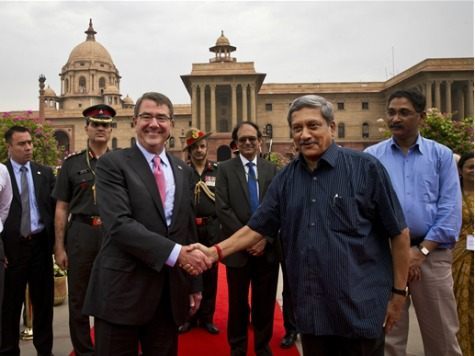On Tuesday, U.S. Defense Secretary Ashton Carter arrived in India to sign a defense agreement that will have a major impact on the region.
“The 2015 U.S.-India Defense Framework that I will sign … will open up this relationship on everything, from maritime security to aircraft carrier and jet engine technology cooperation,” Carter said in Singapore last week.
In recent years, the U.S. has replaced Russia as India’s top supplier of weapons, and now the U.S. promises to work with Indian Prime Minister Narendra Modi’s “Make in India” plan for future equipment production.
Two new projects, one on new kinds of protective clothing for soldiers and another on a next-generation power generator for use on the battlefield, have already been approved.
There is also talk of plans for U.S. defense contractors beginning to manufacturing weapons and other equipment in India, as Modi’s “Make in India” plan incentivizes production in the south Asian nation.
In the past, Carter has been a major proponent of strengthening U.S.-India relations. Carter has been focused on bolstering U.S. presence in Asia, and he sees India as a potential strong ally.
Carter will also have talks with senior-level Indian officials about what the United States can do to reinforce defense ties between the nations.
In 2013, officials in the Obama administration declared their desire to “pivot to Asia” and move defense focus away from the Middle East and instead to the Far East.
China has been posturing aggressively in the South China Sea. Land reclamation projects undertaken by China have raised alarm bells with U.S. officials, and last week, Secretary Carter told media that he wanted China to bring the project to “an immediate and lasting halt.”
In the nearby Indian Ocean, the United States and India conduct annual joint training exercises. China, too, has been seeking to expand its sphere of influence to the Indian Ocean.
Indian Defense Minister Manohar Parrikar, who also signed the defense pact, spoke in great detail with Carter about the strategic relationship between the U.S. and India in regards to maritime security especially.
“If you look around the region, the Indian navy is a strong, or is developing to be a very formidable force,” Rahul Bedi, a journalist specializing in Indian defense issues, said.
Not everyone, however, is pleased about the newly forged friendship between the U.S. and India.
Critics in Islamabad say that this deal may sour the U.S.-Pakistan alliance, including Pakistani Foreign Secretary Aziz Ahmed.
“Any discriminatory treatment is not good for strategic stability,” he said.

COMMENTS
Please let us know if you're having issues with commenting.